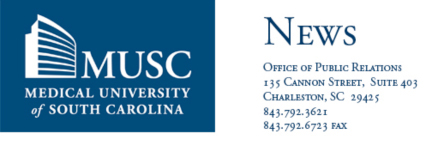
Nov. 24, 2008
CHARLESTON -- The Medical University of South Carolina (MUSC) has announced its plan for dealing with an 11.9 percent cut to its state appropriations approved by the General Assembly in late October. This cut, the third this fiscal year, has brought the cumulative state funding reduction to the University to $16.8 million, or 17.6 percent of its state appropriation.
"Dealing with cuts of this magnitude has been a real challenge," said MUSC President Ray Greenberg, M.D., Ph.D., "And it has taken a few weeks to finalize a plan. We have been guided by a desire to preserve jobs and to be as fair as possible to all employees, while still providing the excellent services that so many people in our local community and state require."
Each unit within the University was requested to propose a budget reduction based upon its particular mission and funding base.
"Given that almost two-thirds of our expenditures go to support personnel there is no way to reduce our spending without impacting employees," said MUSC Vice President for Finance Lisa Montgomery. "We cut travel, supplies and equipment, renovations and leases to the bare bone, but in the end, that was simply not enough."
The University, which employs about 5,000 people, will leave nearly 80 vacant positions unfilled. In addition, a mandatory furlough of four days will be implemented in selected areas that are not clinically-or research-based. Those non-clinical and non-research areas collectively employ more than 1,200 people.
"We considered a campus-wide furlough," said MUSC Provost John Raymond, M.D., "but since so many of our employees are paid through non-state sources of funding, this would not be an effective strategy for saving state dollars. Moreover, in our clinical and research areas, we cannot slow operations and in fact we need to continue to generate as much outside income as possible to offset cuts from the state."
The furlough will begin in January, with monthly paid employees taking unpaid leave one day per month for four months. Hourly paid employees will have a uniform amount deducted from their pay in order to reduce the impact, although they will be permitted to take the leave as negotiated with their supervisors. A handful of positions are proposed for elimination, most of which are filled by temporary employees.
"We recognize that many of our employees are living at the financial edge, so we have asked those with higher incomes to help soften the blow on others," Greenberg said. "Already, about 300 employees have expressed a desire to take either voluntary furloughs or pay cuts. I will be taking eight days of unpaid leave myself, while continuing to devote all of my energies to the university. Many of the other senior administrators already have made similar commitments – the response thus far has been inspiring."
Overall, the plan covers the total loss of state funding to the present, plus an additional 5 percent in anticipated cuts. While contingency plans are in place, it is difficult to estimate the depth of future cuts and MUSC is unable to preclude the possibility of additional furloughs or lay-offs. Regular updates and employee resources can be found at http://budgetimpact.musc.edu.
"It is unfortunate that any employees will be furloughed or laid off, as this was our option of last resort," Montgomery said. "We are working on a plan to allow fellow employees and others to donate to a fund in our MUSC Foundation to provide support to those employees who need financial assistance."
"Even though the Medical University is a large organization, faculty work very closely with support staff and we feel like a family," said MUSC Vice President for Medical Affairs Jerry Reves, M.D. "As in all families, we will do our best to look out for each other and help each other during this difficult time. We also want to emphasize that this plan will not affect the continuous provision of quality medical care and top-notch health education that the citizens of our state have come to depend on."
"We feel confident that in working together, we have done our best to minimize the impact of these cuts to maintain the great spirit and determination of the MUSC family to continue serving the citizens of South Carolina," Greenberg said.
About MUSC
Founded in 1824 in Charleston, The Medical University of South Carolina is the oldest medical school in the South. Today, MUSC continues the tradition of excellence in education, research, and patient care. MUSC educates and trains more than 3,000 students and residents, and has nearly 11,000 employees, including 1,500 faculty members. As the largest non-federal employer in Charleston, the university and its affiliates have collective annual budgets in excess of $1.6 billion. MUSC operates a 750-bed medical center, which includes a nationally recognized Children's Hospital and a leading Institute of Psychiatry. For more information on academic information or clinical services, visit www.musc.edu or www.muschealth.com.
#####